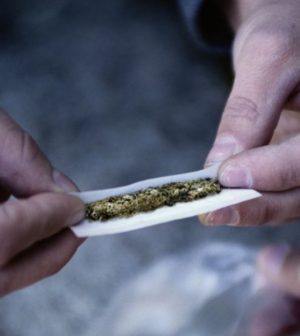- Could Your Grocery Store Meat Be Causing Recurring UTIs?
- Are You Making This Expensive Thermostat Error This Winter?
- Recognizing the Signs of Hypothyroidism
- 10 Strategies to Overcome Insomnia
- Could Artificial Sweeteners Be Aging the Brain Faster?
- Techniques for Soothing Your Nervous System
- Does the Water in Your House Smell Funny? Here’s Why
- Can a Daily Dose of Apple Cider Vinegar Actually Aid Weight Loss?
- 6 Health Beverages That Can Actually Spike Your Blood Sugar
- Treatment Options for Social Anxiety Disorder
Marijuana Use by Youth: After Legalization, Education Seems to Matter

After their U.S. states legalize marijuana, young adults who aren’t in college are more likely than college kids to use the drug and progress to cannabis use disorder, a new study finds.
Prior to legalization, 23% of non-college young adults reported using cannabis in the past month, and after legalization it went up to 28%, researchers found. Among U.S. college students in the same age bracket, use only increased by 1 percentage point after legalization, from 20% to 21%.
“Researchers should continue to monitor changes in prevalence of cannabis use, frequent cannabis use and cannabis use disorder among young adults while the cannabis landscape in the U.S. continues to evolve,” said study co-author Dr. Silvia Martins, a professor of epidemiology at Columbia Mailman School of Public Health.
“It is also important to better understand why increases to date were more pronounced in young adults not in college,” Martins added in a Columbia news release.
Researchers used data from the National Survey on Drug Use and Health from 2008 to 2019, which surveyed college-eligible young adults ages 18 to 23 about their drug and alcohol use.
Frequent cannabis use — defined as using the drug at least 20 times in the past month — increased from 12% to 14% among non-college young adults. Among college students, the prevalence stayed the same at 7%.
Cannabis use disorder — continuing to use the drug despite the problems it causes in your life — also grew among non-college participants, rising from 12% to 15%. It remained unchanged at 10% among college students.
“Our research doesn’t address why these changes are occurring, but if you’ve been to a state that has legalized recreational cannabis use you’ll notice the drug is widely available and prominently advertised. Americans’ beliefs about the benefits and harms of cannabis use are also changing rapidly,” said study co-author David Kerr, a professor at Oregon State University’s School of Psychological Science.
Kerr cited a report from the Monitoring the Future study showing that in 2020 only 21% of young adults believed regular cannabis use puts people at risk of harm, versus the 58% of young adults who believed that 20 years ago.
Meanwhile, the potency of cannabis is higher in legal states and has increased dramatically over time, Kerr noted.
It’s possible that more people are experiencing cannabis use disorder in part because of the increased acceptance and fewer negative social consequences, the researchers said.
“Cannabis use disorder involves inability to fulfill major obligations at work, school or home, and then continued use,” Kerr said. “It is possible that there may be fewer social consequences now that the environment is more accommodating.
“If so, then our findings may actually have underestimated these increases,” he added.
Recent cannabis use increased more among young adults ages 21 to 23 than for those ages 18 to 20, the study found.
“That’s consistent with our prior work, that it increased more among the people who could legally buy it and use it,” Kerr said. “It suggests the law provisions requiring people to be at least 21 are at least somewhat effective.”
The study was published recently in the American Journal of Preventive Medicine. The research was funded by a grant from the U.S. National Institute on Drug Abuse.
More information
The U.S. Centers for Disease Control and Prevention has more on the impact of marijuana on young brains.
SOURCE: Columbia University, news release, Aug. 1, 2023
Source: HealthDay
Copyright © 2026 HealthDay. All rights reserved.










